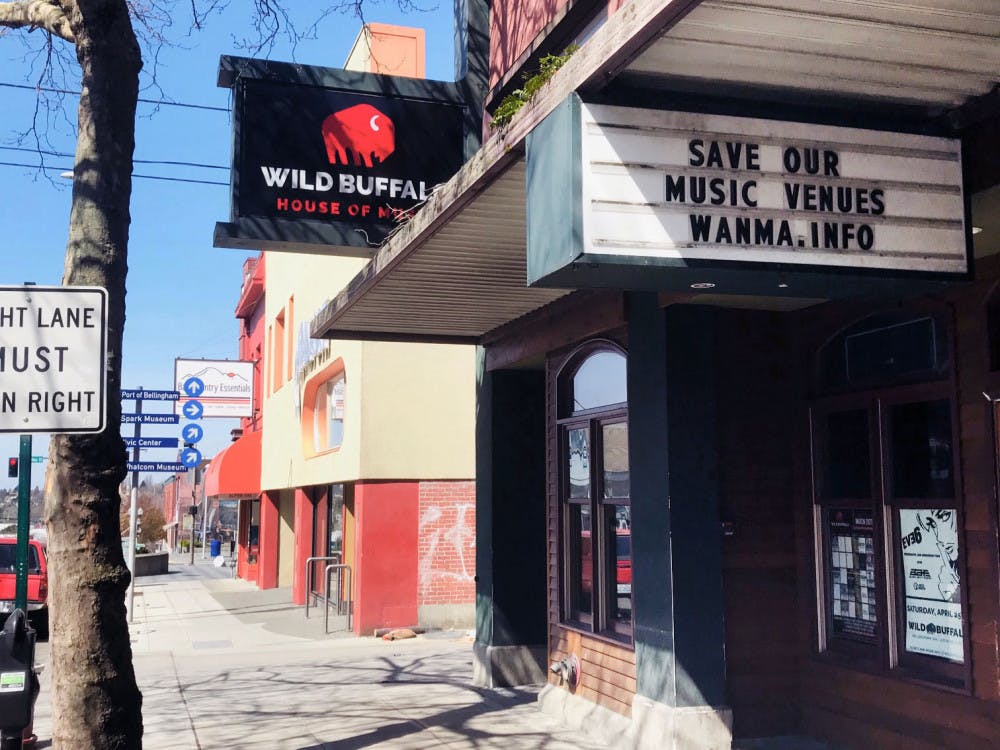
With public gatherings banned, live music spaces fear extinction
By Riley Currie
From the college house show circuit to venues booking international touring acts, live music is a cornerstone of life in Bellingham. As public spaces and venues remain closed during the COVID-19 pandemic, live music has come to a halt.
On March 24, Gov. Jay Inslee addressed the state with a “Stay Home, Stay Healthy” order that immediately banned “all gatherings of people for social, spiritual and recreational purposes.” This included concerts venues, bars, clubs and all other spaces that feature live music.
Concerts seem like a small price to pay during social distancing measures necessary to save lives. But as restaurants turn to pantry sales and food bank services and many non-essential businesses slowly go online, Bellingham’s concert venues face a unique set of problems.
“80% of our year is now gone,” said Craig Jewell, co-owner and talent buyer at the Wild Buffalo House of Music.
Unlike bars and restaurants, the social distancing timeline for venues extends into 2021 or 2022.
“Show cancellations have more or less wiped out my employment completely,” said Zack Fijal, production and marketing manager at Wild Buffalo. Wild Buffalo employs 25 people as staff, but that number excludes the thousands of independent contractors — the touring and local musicians — who play at Wild Buffalo each year.
All tours have been postponed indefinitely, following social distancing measures, and rescheduling isn’t as simple as naming new dates.
“It's like one big puzzle, with individual pieces being in different cities, states and even countries,” Fijal said. “It's going to take months for larger tours to pick back up.”
Tours being postponed or canceled presents a number of financial issues for musicians and venues alike.
“There's lots of people that depend on music venues as their main source of income,” Jewell said. Streaming is quick and easy, but it doesn’t bring money to artists. Jewell estimates that only the top grossing 1% of artists are able to make money via streaming services.
The relationship between venues and musicians is a symbiotic one. Without touring musicians, venues can’t stay in business; without venues to play at, artists can’t tour.
“This is a passion project. We don't make a lot of money as venues, we do it because we love music,” Jewell said. As a co-owner, he’s unable to collect unemployment.
As cancellations and closures stretch on, the owners and staff of venues are finding themselves with limited resources and limited options.
“My whole life is in that club,” said Benjamin Lemons, owner of Studio B, a Bellingham nightclub and concert venue. “I probably spend between 50 … 70 hours a week doing stuff for it. It’s my main source of employment.” Lemons as an owner is unable to collect unemployment.
Studio B employs about 15 people in the community.
The overall community response has been one of solidarity. Musicians are finding ways to share their music online and support one another. Relief funds, like the Bellingham Arts Community Relief Fund, are being put in place to help spread resources among the community. Radio stations are pivoting to outreach and informational programming.
A petition put forth by the Washington Nightlife & Music Association is asking elected officials to redirect cash assistance and relief to venues that run the risk of going out of business.
“We have all come to a group consensus of understanding how severe this situation is,” said James Bonaci, member of Bellingham band Beautiful Freaks and booking intern at The Shakedown, another local music venue. “I think it's important that we all agree not to be fighting to be the first band back on the road.”
For musicians like Bonaci, safety remains the number one priority, but there’s still concern for what may happen to live music venues as time passes. In a city with constant cultural turnover due to college students coming and going, only a handful of small venues keep the music scene afloat.
“It's going to be a group effort if we want to be able to save our local art scene,” Bonaci said. “I am really hoping that we’re able to come together and pool our resources to recover from this.”
The importance of Bellingham’s independent venues can’t be understated for musicians and concertgoers.
“These spaces have done so much for so many artists over the years,” Bonaci added. “On an emotional level, what they've done for people, you just can't recreate that.”





